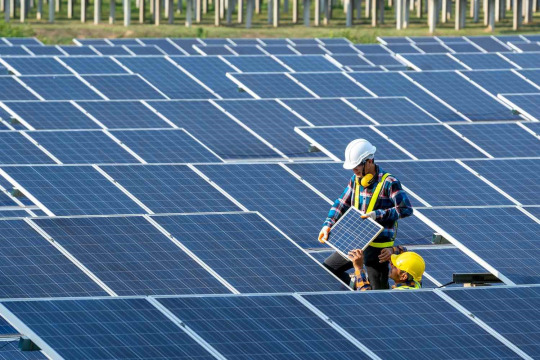Don't wanna be here? Send us removal request.
Text
Solar Panels vs. Conventional Energy: Which is Cheaper?

In today’s world, the rising demand for energy and the urgent need to address environmental concerns have pushed people to explore sustainable energy sources. Among these, solar energy stands out as a promising alternative to conventional energy sources. But when it comes to costs, many people in Pakistan ask, “Which is cheaper: solar panels or conventional energy?” In this article, we’ll dive deep into the cost comparison, focusing on factors like installation, maintenance, and long-term savings.
Understanding Solar Panels
Solar panels convert sunlight into electricity through photovoltaic cells. They are installed on rooftops, open fields, or other sunlit areas and can power homes, businesses, and even industries. The initial investment might seem high, but the benefits, especially in a sun-rich country like Pakistan, are significant. Over time, they prove to be a cost-effective and environmentally friendly solution.
What is Conventional Energy?
Conventional energy refers to electricity generated from fossil fuels such as coal, oil, and natural gas. This form of energy is widely used across Pakistan, powering homes, industries, and businesses. However, the rising costs of fossil fuels and the inefficiencies in the national grid system have made it less reliable and more expensive over time.
Solar Panel Cost in Pakistan
One of the key factors in the debate between solar panels and conventional energy is the cost. Solar panel installation has become more affordable over the years, and the solar panel cost in Pakistan varies depending on the type and size of the system you choose. On average, a residential solar setup can cost between PKR 300,000 to PKR 800,000. While this may seem like a significant upfront expense, government incentives, tax rebates, and financing options are available to reduce the burden.
Upfront Costs: Solar Panels vs. Conventional Energy
Solar Panels:
The initial cost includes purchasing the solar panels, inverters, batteries (if needed), and installation charges.
For a typical home, the upfront cost may range from PKR 300,000 to PKR 1,000,000 depending on the energy requirements.
Government subsidies and net metering options can further reduce these costs.
Conventional Energy:
Conventional energy has no upfront cost for infrastructure since homes are already connected to the grid.
However, initial connection charges and monthly bills add up over time, making it more expensive in the long run.
Operational Costs
Solar Panels:
Solar energy systems have minimal operational costs. Once installed, they harness sunlight for free.
Occasional cleaning and maintenance are required, but these costs are negligible compared to monthly electricity bills.
Conventional Energy:
Electricity bills are recurring and increase over time due to rising fuel prices and inflation.
Fuel-based power plants and grid maintenance costs are indirectly passed on to consumers.
Long-Term Savings
One of the biggest advantages of solar panels is the long-term savings they offer:
A solar energy system typically pays for itself within 5-7 years through reduced electricity bills.
With a lifespan of 20-25 years, the savings over time are substantial.
Additionally, with net metering in Pakistan, you can sell excess electricity back to the grid, further offsetting costs.
On the other hand, conventional energy only becomes more expensive over time. The dependency on fossil fuels makes the system vulnerable to price hikes, and consumers often bear the brunt of inefficiencies in the national grid.
Environmental Impact
While the cost comparison is critical, it’s also essential to consider the environmental implications:
Solar panels generate clean and renewable energy, reducing carbon emissions and pollution.
Conventional energy sources rely on fossil fuels, contributing to greenhouse gas emissions and global warming.
Switching to solar energy not only saves money but also helps protect the environment for future generations.
Accessibility and Reliability
Solar Panels:
Solar energy systems are independent of the national grid, making them more reliable, especially in areas with frequent load-shedding.
In regions with abundant sunlight, such as Pakistan, solar panels perform efficiently year-round.
Conventional Energy:
The national grid in Pakistan faces challenges like frequent outages and voltage fluctuations, which can disrupt daily life and damage appliances.
Dependency on imported fuels makes conventional energy less reliable and more expensive.
Solar Panel Cost in Pakistan: A Game-Changer
With falling prices and increasing awareness, the solar panel cost in Pakistan is no longer a barrier for many households. Government initiatives like net metering and tax exemptions have made solar energy more accessible and affordable. Moreover, the long-term benefits far outweigh the initial investment, making it a wise choice for those looking to reduce their energy costs and carbon footprint.
Conclusion
When comparing solar panels and conventional energy in terms of cost, solar panels emerge as the clear winner for long-term savings and environmental sustainability. While the initial investment may be higher, the reduced operational costs, long lifespan, and potential for income through net metering make solar panels a smarter choice for households and businesses in Pakistan. With the availability of financing options and decreasing solar panel cost in Pakistan, now is the perfect time to make the switch to clean, reliable, and affordable solar energy.
1 note
·
View note